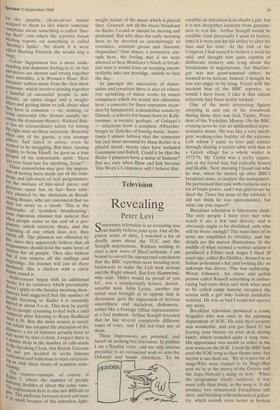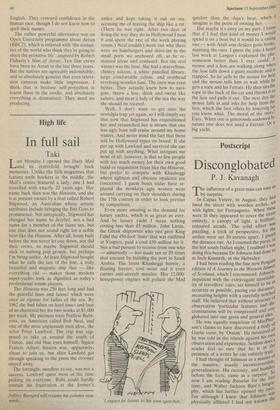Television
Revealing
Peter Levi
C ometimes television is so revealing you can hardly believe your eyes. Out of the purest sense of duty, I watched a lot of deadly news about the TUC and the Scargill negotiations. Without wishing to start a new wave of MacCarthyism, I am bound to record the unexpected conclusion that the BBC reporters were bending over backwards to make the Left look serious and the Right absurd. But Eric Hammond, who said: 'Hitler would be proud of you lot', was a transparently honest, decent, sensible man. John Lyons, another top union man brought in to oppose him in discussion, gave the impression of devious smoothness and maladroit dishonesty, rather like a Foreign Office representative at a bad moment. Arthur Scargill revealed that he has several completely different tones of voice, and I did not trust any of them.
These impressions are personal, and based on nothing but television. In politics I am a floating voter, and my only serious prejudice is an occasional wish to arm the Orkneys and bomb Aberdeen. To be credible on television is no doubt a gift, but it is not altogether separate from genuine- ness in real life. Arthur Scargill would be credible (and personally I used to believe him) if it were not for his ability to alter his face and his tone. At the end of the Congress I had ceased to believe a word he said, and thought him quite capable of deliberate trickery and lying about the breakdown of negotiations. Ian MacGre- gor was not good-natured either; he seemed to be furious. rndeed, I thought he was too angry to he lying. Faced with the insolent bias of the BBC reporter, so would I have been. I take it that almost everyone had been neatly tricked.
One of the most interesting figures creeping in and out of the woodwork during those days was Jack Taylor, Presi- dent of the Yorkshire Miners. On the BBC evening news he was an unidentified repre- sentative miner. He was like a very intelli- gent working-class builder of the extreme Left whom I came to love and admire through sharing a tavern table with him in a Greek village for a whole winter in 1975/76. Mr Taylor was a tricky arguer, just as my friend was, but radically honest and likable. Next morning I found out who he was, when he turned up after BBC1 breakfast news, to analyse the newspapers. He performed that task with coolness and a lot of brain-power, and I was glad to see he liked the Times but none of the tabloids. I did not think he was open-minded, but what can you expect?
Breakfast television is lukewarm slush. The only people I have ever met who watch it are a few taxi drivers, and it obviously ought to be abolished, only who will be brave enough? The main lines of its news are simplified to triviality, and the details are the merest illustrations. In the middle of what seemed a serious session it produced a Fifties rock singer I liked 30 years ago, called Bo Diddley, dressed in an Italian policeman's hat and looking like an unkempt bus driver. This was saddening. Worse followed. An obese and girlish person called Russell something in emhar- rasing bad-taste dress and with what used to be called. camp hunour occupied the screen with a girl who looked justifiably worried. He was so bad I could not survive any more.
Breakfast television produced a comic brigadier who was once in the planning department of SOE. He said their security was wonderful, and you got fined £5 for leaving your blotter on your desk during lunch, which sounded quite a long time. His appearance was meant to usher in the new series on the SOE. I wish the BBC had used the SOE song as their theme tune, but maybe it nas died out. 'We're a poor lot of mugs/Who were trained to be thugs./But now we're at the mercy of the Greeks and the Jugs./Nobody's using us now.' When the programme finally surfaced, it was more jolly than brisk, as the song is. It did produce two sensational Frenchmen still alive, and bristling with understated gallan- try, which sounds even better in broken English. They restored confidence in the human race, though I do not know how to spell their names.
The rather powerful alternative was an Open University programme about Arran (BBC2), which is infested with the roman- tics of the world who think they're going to share the primitive life', inspired by Robert Flaherty's Man of Arran. Ten film crews have been to Arran in the last three years. But the natives are agreeably indomitable. and so absolutely genuine that even televi- sion cameras make little impression. I think that is because self-projection is learnt there in the cradle, and absolutely everything is dramatised. They need no producing.



















































 Previous page
Previous page